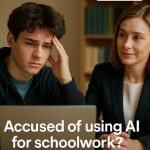Accused of Misusing Artificial Intelligence at School? | New York Student Defense Lawyer

Accused of Using Artificial Intelligence at School? We Can Help.
Something You Might Not Know:
AI-detection tools used by schools are often wrong up to 30% of the time, according to recent studies. Yet many New York schools rely on these tools as if they’re infallible. That means a perfectly honest student can be accused of “AI-assisted cheating” — and face serious disciplinary action based on flawed software, not facts.
At The Law Offices of Ronald S. Cook, P.C., we help students and families challenge these accusations with evidence, advocacy, and experience.
Understanding AI Misuse Allegations in Schools
Artificial intelligence tools like ChatGPT, Grammarly, and QuillBot are now as common as calculators once were. But many schools have not updated their policies to keep pace with technology.
Students are often accused of “improperly using AI” when their writing style, tone, or word choice triggers a detection algorithm. These tools scan for “AI-like patterns,” but they can’t distinguish between genuine writing and advanced vocabulary or polished grammar.
In New York, once a teacher files a report, students may face:
-
Academic integrity hearings
-
Failing grades or course penalties
-
Suspension or expulsion
-
Permanent notations on their academic record
Even a minor disciplinary note can affect scholarships, graduate school applications, and future employment opportunities.
How Our Law Firm Can Help
Our law firm has experience representing students throughout New York who have been accused of AI-related academic misconduct. We help by:
-
Reviewing the school’s evidence and AI-detection reports
-
Challenging unreliable software results and procedural errors
-
Preparing written responses and hearing statements
-
Ensuring compliance with student due process rights under New York Education Law
-
Negotiating resolutions that protect your record and future
Each school — whether a high school, SUNY campus, or private university — has its own process. Having a lawyer who understands these systems ensures that your voice is heard and your rights are protected.
Why These Cases Require Legal Experience
AI-detection systems such as GPTZero, Turnitin’s AI Detector, and Copyleaks are not certified forensic tools. Yet, some New York institutions treat them as conclusive evidence.
A source stated that even minor text changes can produce false positives, meaning a perfectly human essay could be flagged as AI-generated.
A lawyer familiar with academic defense can identify inconsistencies in detection data and highlight due process violations — often leading to dismissed or reduced charges.
Protect Your Education and Reputation
The stakes are high. An academic dishonesty finding can follow you long after graduation. Universities share disciplinary data through internal networks, and certain notations can affect applications to graduate programs, internships, and even professional licensing boards. When you bring in an experienced lawyer, you take control of the process instead of being steamrolled by it. Our lawyers are proficient in litigating using advanced technologies. Particularly, our practice is well-versed in addressing the challenges posed by generative artificial intelligence. Attorney Ronald S. Cook, an acclaimed author with a focus on Artificial Intelligence, provides deep insights into AI issues. Click on the link below to view Attorney Cook’s book, available on Amazon.com, entitled “Mastering Artificial Intelligence in Legal Practice”
Contact our law firm today to discuss your legal situation
If you or your child has been accused of using artificial intelligence improperly for schoolwork, don’t face it alone.
The sooner you act, the more options you’ll have to protect your academic record. Our team will help you make informed choices and avoid costly filing mistakes.
📞 Call (888) 275-2620 to request your consultation.
CLICK HERE to contact the law firm.
CLICK HERE for information regarding other books published by Attorney Ronald S. Cook.



